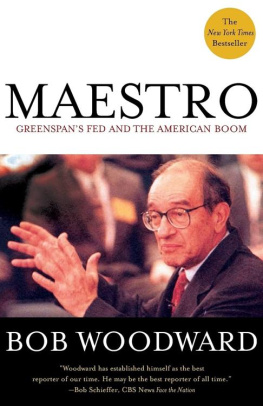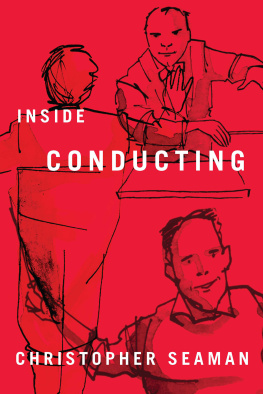Table of Contents
Getting It All Wrong
MY MEETING WAS BEGINNING TO SPIN OUT OF CONTROL.
For the life of me, cried Sarah in exasperation, I dont see why were spending so much time talking about developing this new product when we know that our customers havent shown any interest in it. We have all the research data. It isnt what they want.
I could see that Rick was about to lose it. Look out the window, Sarah, he snapped. Didnt anyone tell you that the economy has changed? Our customers dont know what they want. Your data may seem clear but youre not on the front lines like our salespeople, talking with customers. Look at our numbers, he said, shaking the papers in front of him. They arent even buying their favorite products the way they used to. Our best shot at staying alive out there is to introduce something new.
WellSarahs voice dripped sarcasmif sales could properly execute the plan with our current products thered be plenty of results.
I noticed that Malcolm looked eager to join the debate and I called on him to interject. Its not enough for us to ask what they want. Weve got to understand what they would rush to buy if it were offered.
Now wait a minute, Mike chimed in. Lets not throw out the baby with the bathwater. Weve spent a decade developing an incredible production capacity that keeps costs low and quality high. Lets not start switching to expensive new products. In this economy theyre not going to buy anything unless its at an affordable price. Dont forget that.
Yeah, but are we taking full advantage of the new technologies we can harness? Ethan countered. Weve come up with some groundbreaking ideas we could develop, if sales and marketing wouldnt always shoot them down.
Id seen this type of argument break out in meetings before: the heads of marketing, sales, strategy, manufacturing, and R&D going after one another. I had to stop it now because Id learned that their bickering could degenerate quickly.
Look, everybody, just calm down. This quarreling is getting us nowhere.
I was already in my second month as the head of this troubled division but I didnt seem to be making any progress with my team. When the CEO recruited me, I was charged with reversing our downward slide, and helping to return the company to profitability. Initially I was excited about the seasoned high-level executives who would form my leadership team.
Large or small, every group Id led during my twenty-five-year career had outperformed its expectations. Now this was my chance to bring that kind of success to a team of leaders who were the cream of the crop. I felt confident that my group had the talent to bounce back; it was simply suffering from a lack of strong leadership. And I was eager to prove that my division could guide the company to its former heights.
I soon discovered, however, that this team did not act like the ones Id led before. Despite their skills, these experts had settled into attitudes that were so colored by their diverse professional disciplines that they continually locked horns over whatever issue was up for discussion. For such intelligent people, they were surprisingly blind to any potential common ground between them, or simply unwilling to acknowledge it.
Im determined to move forward on this issue, I announced after yet another fruitless product-development meeting. Im going to schedule one-on-one meetings this week with each of you. I want to hear all points of view and then we can reach a resolution once and for all.
Throughout my career Id often found that breaking a problem down into its most basic elements would eventually lead me to its solution. In fact, Ive always loved the challenge of bringing order to a collection of interlocking parts, like solving a jigsaw puzzle. Sorting out all those strangely shaped pieces and seeing them fall into place gave me enormous satisfaction. But with a company as large as this one most of the pieces lay beyond my own reach, and I had to enlist my team members to help me put them in order. It was certainly not a one-man job, and I was beginning to doubt whether my team would ever be able to solve this puzzle.
Despite my doubts, the individual meetings with my department heads later that week went very well. I was impressed by how capably each leader managed his units day-to-day problems and challenges. I could feel how ambitious they were about exceeding the quarterly performance targets. I learned about their priorities and how they viewed the companys future. After hearing all points of view, I was convinced that I could find their common ground and arrive at the best way for them to work together.
At the next group meeting I thanked them all for offering me such useful feedback, and assured them that I had listened very carefully. Then I announced our new battle plan, and laid out the actions each leader would take in implementing it. Because it was so important that they understand my plan I diagrammed the process in some detail on a chart.
When I finished my explanation the room was silent. I surmised that the presentation had gone over well, because when I asked for questions nobody had any to ask. Success! My team had finally turned a corner, and I was relieved that we were now moving forward with one clear plan.
But during the following weeks my hope again turned to frustration as it gradually dawned on me that each leader was still focusing solely on the success of his own division. There was no more collaboration across units than there had been before. People were working hard, but it was as if they had blinders on. It seemed that despite my best efforts, nothing much had changed.
Then the bombshell hita call from the CEO.
Hows it going? he asked.
Oh, things are going well. I developed a very good plan and were implementing it now.
Well, I hear through the grapevine that your team is not working well together. Theyre not sensing strong leadership from you and things are a bit adrift. I just thought youd want to know.
How could that be? I had laid out a plan. I detailed what had to be done and by whom. I drew it all out on the board. They understood it. No one raised any objections. I was shocked. And, even more than the assertion that my team wasnt working well together, the criticism of my leadership stung me. I was doing the same things that had worked with my teams in the past. What was so different now?
Hearing from the CEO was not only embarrassing and distressing, but it was just the latest letdown in two months of intensity and disappointment at work. One of the few bright spots in the day had become my trip to the gym, and that evenings workout was longer than most.
By the time I made it home my sixteen-year-old daughter was finishing a violin lesson in the living room with her teacher, Robert. As I rummaged through the fridge for leftovers, I overheard him raving about the new conductor of his orchestra. Hes got this rare ability of getting headstrong and independent people like us to set aside our differences and work toward making the music come alive.
Headstrong? Set aside their differences? Boy, did that sound familiar. I was curious to hear about anyone who could get willful and stubborn professionals to collaborate, so I brought it up to Robert as I walked him out to his car.
I couldnt help but hear what you said about the new conductor of your orchestra. You seem very excited about him.










